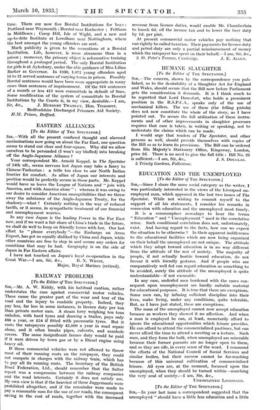RAILWAY PROBLEMS
[To the Editor of THE SPECTATOR.] SLIt,—Mr. A. W. Kiddy, with his habitual caution, rather understates the case against commercial motor vehicles. These cause the greater part of the wear and tear of the road and the injury to roadside property. Indeed, they pay less, far less in some instances, in licence duty per ton than private motor cars. A steam lorry weighing ten tons unladen, with hard tyres and drawing a trailor, pays only £66 a year, or £54 if fitted with pneumatic tyres. But it costs the ratepayers possibly £1,000 a year in road repair alone, and it often breaks pipes, culverts, and manhole covers. The same insignificant licence duty would be paid if it were driven by town gas or by a Diesel engine using heavy oil.
If these commercial vehicles were not allowed to throw most of their running costs on the ratepayer, they could not compete in charges with the railway train, which has to pay all its running costs. The Secretary of the British Road Federation, Ltd., should remember that the Salter report was a compromise between the railway companies and the road interests. Certainly it does not satisfy me. My own view is that if the heaviest of these Juggernauts were prohibited altogether, and if the remainder were made to pay a reasonable sum for the use of our roads, the consequent saying in the cost of roads, together with the increased
revenue from licence duties, would enable Mr. Chamberlain to knock ad. off the income tax and to lower the beer duty by ld. per pint.
At present commercial motor vehicles pay nothing that can rightly be called taxation. Their payments for licence duty and petrol duty are only a partial reimbursement of money which the ratepayer has spent on their behalf.—I am, Sir, &c.,
2 St. Peter's Terrace, Cambridge. J. E. ALLEN.






































 Previous page
Previous page